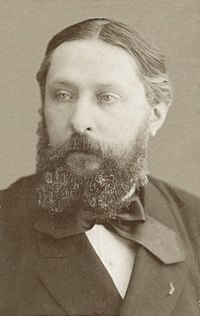Sully Prudhomme
Sully Prudhomme | |
|---|---|
 Prudhomme in the 1880s | |
| Born | René François Armand Prudhomme 16 March 1839 Paris, France |
| Died | 6 September 1907 (aged 68) Châtenay-Malabry, France |
| Occupation | Writer |
| Language | French |
| Nationality | French |
| Genre | |
| Literary movement | Parnassianism |
| Notable awards | Nobel Prize in Literature 1901 |
René François Armand "Sully" Prudhomme (French: [syli pʁydɔm]; 16 March 1839 – 6 September 1907) was a French poet and essayist. He was the first winner of the Nobel Prize in Literature in 1901.
Born in Paris, Prudhomme originally studied to be an engineer, but turned to philosophy and later to poetry; he declared it as his intention to create scientific poetry for modern times. In character sincere and melancholic, he was linked to the Parnassus school, although, at the same time, his work displays characteristics of its own.
Early life
Prudhomme's parents were M. Sully Prudhomme and Clotilde Caillat. They had been engaged for 10 years before they had felt financially able to marry. When Prudhomme was two, his father, a shopkeeper, died. His mother and he relocated to Prudhomme's uncle's house. Prudhomme joined his father's name "Sully" with his surname Prudhomme, becoming Sully-Prudhomme. He was interested in classic literature and mathematics in school. He also considered entering the Dominican order, but decided against it.[1][2]
Prudhomme attended the Lycée Bonaparte, but eye trouble interrupted his studies. He worked for a while in the Creusot region for the Schneider steel foundry, and then began studying law in a notary's office. The favourable reception of his early poems by the Conférence La Bruyère (a student society) encouraged him to begin a literary career.
Writing
His first collection, Stances et Poèmes ("Stanzas and Poems", 1865), was praised by
During his career, Prudhomme gradually shifted from the sentimental style of his first books towards a more personal style which unified the formality of the
After Le Bonheur, Prudhomme turned from poetry to write essays on
Nobel Prize
The first writer to receive the
Death
At the end of his life, his poor health (which had troubled him ever since 1870) forced him to live almost as a
Bibliography
Poetry
- 1865: Stances et poèmes
- 1866: Les épreuves
- 1868: Croquis italiens
- 1869: Les solitudes: poésies [Les écuries d’Augias]
- 1872: Les destins
- 1874: La révolte des fleurs
- 1874: La France
- 1875: Les vaines tendresses
- 1876: Le zénith, previously published in Revue des deux mondes
- 1878: La justice
- 1865–1888: Poésie
- 1886: Le prisme, poésies diverses
- 1888: Le bonheur
- 1908: Épaves
Prose
- 1883–1908: Œuvres de Sully Prudhomme (poetry and prose), 8 volumes, A. Lemerre
- 1896: Que sais-je? (philosophy)
- 1901: Testament poétique (essays)
- 1905: La vraie religion selon Pascal (essays)
- 1922: Journal intime: lettres-pensée
References
- ^ "Sully Prudhomme – Biographical". Nobel Foundation. Retrieved 13 July 2016.
- ^ https://www.authorscalendar.info/prudhomm.htm
External links
- Gosse, Edmund William (1911). . In Chisholm, Hugh (ed.). Encyclopædia Britannica. Vol. 26 (11th ed.). Cambridge University Press. p. 59.
- Gale Contemporary Authors Online, from the Gale Biography Resource Center database
- Petri Liukkonen. "Sully Prudhomme". Books and Writers.
- Sully Prudhomme on Nobelprize.org
- britannica.com
- List of works
- Poesies.net: Sully Prudhomme
- Poesies.net: Le Zénith
- Works by Sully Prudhomme at Project Gutenberg
- Works by or about Sully Prudhomme at Internet Archive
- Works by Sully Prudhomme at LibriVox (public domain audiobooks)

